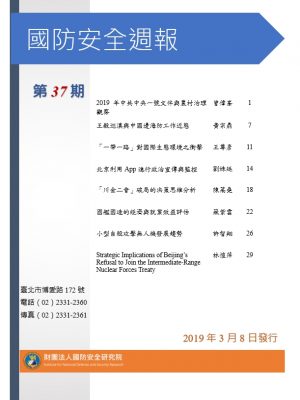Strategic Implications of Beijing’s Refusal to Join the Intermediate—Range Nuclear Forces Treaty
2019.03.08
瀏覽數
214
I. News Focus
The United States (US) President Donald Trump and Secretary of State Mike Pompeo announced separately on February 1, 2019, that the US would suspend its obligations under the Intermediate-Range Nuclear Forces (INF) Treaty on the following day, February 2, and that the US would also formally withdraw from the treaty in six months. Shortly after, on that same day, Russia President Vladimir Putin likewise announced that Russia was suspending participation in the INF Treaty. On February 16, in an effort to salvage the INF Treaty, German Chancellor Angela Merkel appealed to the People’s Republic of China (PRC) in the Munich Security Conference to join the INF Treaty, which would allow the treaty to become a global one, rather than only between the US and Russia. However, the PRC rejected such an appeal on the same day.[1]
II. Security Implications
1. The INF Treaty would place the PRC military at a disadvantage
Most of the PRC’s ballistic missiles, such as DF-15 and DF-21, are ground-based, including the class of missiles aimed at Taiwan, and would thus be prohibited in the INF Treaty terms. As a result, Yang Jiechi (楊潔篪), the highest-ranking PRC official in the Munich Security Conference, who is a member of the Politburo and director of the Office of Foreign Affairs, expressed that the PRC missiles were defensive and that the PRC was opposed to the multilateralization of the INF. A retired General Yao Yunzhu (姚雲竹) in the PRC delegation in Munich also argued that because the mostly ground-based missiles of the PRC would be placed at a disadvantage, a new INF Treaty would only work if it included sea- and air-launched missiles. She referred to the US reliance on operating primarily sea- and air-launched missiles in order to remain compliant with the INF Treaty.
2. The INF Treaty will dissolve in six months
Although the impending demise of the INF Treaty has given rise to an impressive series of arguments for saving it, there seems to be no mutual trust and understanding among the US, Russia, and PRC. And in Article XV of the INF Treaty, it states that if a party to the treaty “decides that extraordinary events related to the subject matter of this Treaty have jeopardized its supreme interests, it shall give notice of its decision to withdraw to the other Party six months prior to withdrawal from this Treaty.” [2]As a result, the INF Treaty will cease to exist after six months when both the US and Russia formally withdraw from the treaty.
III. Trend Analysis
1. The US will deploy ground-based ballistic missiles to deter the PRC
As the PRC is the great power competitor to the US in the Indo-Pacific region and “has invested heavily in a conventional missile-based anti-access/area-denial strategy,”[3] which can provide the PRC “a relatively inexpensive conventional means to hold the U.S. bases and ships at risk across the Western Pacific,”[4] an excellent way for the US to maintain military superiority in the Indo-Pacific is to deploy ground-based missiles in the Indo-Pacific, especially along the first-island chain. Because the PRC is the main reason the US is withdrawing from the INF Treaty, a small arms race will thus arise between the PRC and US after the six-month notice expires.
2. A “Cuban Missile Crisis” situation could arise in the Indo-Pacific
If the US deploys ground-based ballistic missiles in any of the territories or countries along the first island chain for deterrence purpose against the PRC’s missiles, it may cause a backlash from the PRC, provoking gigantic reactions from Beijing. As a result, a “Cuban Missile Crisis”5[] (CMC) type of situation may arise in the Indo-Pacific region. The essential features of the CMC were (1) that a move by one party (the USSR) to move non-conventional weapons (medium-range ballistic missiles [MRBM]) within medium-range striking distance placed the other party (the US) in a situation of perceived unacceptable vulnerability, leading to a volatile situation which could have precipitated all-out warfare, and (2) the threatened party reacted by naval blockade to try to prevent this deployment.
[1] Robin Emmott, “China rebuffs Germany’s call for U.S. missile deal with Russia,” Reuters, February 17, 2019, https://www.reuters.com/article/us-germany-security-china/china-rebuffs-germanys-call-for-u-s-missile-deal-with-russia-idUSKCN1Q50NZ
[2] Treaty Between the United States of America and the Union of Soviet Socialist Republics on the Elimination of Their Intermediate-Range and Shorter-Range Missiles (INF Treaty), December 8, 1987, https://www.state.gov/t/avc/trty/102360.htm#text
[3] Eric Sayers, “The Intermediate-Range Nuclear Forces Treaty and the future of the Indo-Pacific military balance,” War on the Rocks, February 13, 2018, https://warontherocks.com/2018/02/asia-inf/
[4] Ibid.
[5] Aleksandr Fursenko and Timothy Naftali, “One Hell of a Gamble”: Khrushchev, Castro, and Kennedy, 1958-1964: The Secret History of the Cuban Missile Crisis (New York: W. W. Norton, 1998).


